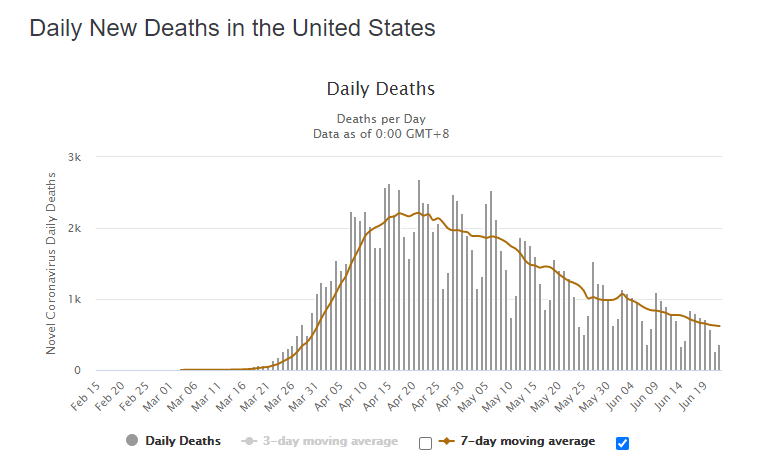
I'm trying to sort this out and write while very upset by the so-called 'reporting' on COVID-19. The tldr version is that too many media sources seem to be deliberately misusing data to push a story that seems to me to be very untrue. If you wish to say they are “Lying with Statistics” (the title of a famous book from the early 1950s – so you see how long this has been going on) I couldn't honestly say that you're wrong. It's too uniformly produced to believe that it is either accidental or from ignorance.
Anyway. The current phrase is about a “surge in new cases” in one state or area or another. It is true that new cases are increasing, although calling them a surge seems a stretch. An increase in new cases in any place is hardly unexpected given:
- viruses are spread by networks and nodes and therefore never evenly distributed,
- the “15-day lockdown” was never supposed to end infections but to “flatten the curve” so that hospitals didn't get overwhelmed,
- once “peaceful protests” were allowed where social distancing didn't matter it was inevitable that it wouldn't matter in lots of other places,
- testing (both viral and serological) increased to over 500,000/day,
- lots of people who didn't feel sick got tested, and
- the positivity rate (around 5%) stayed the same. What is being 'reported is mere observance of the expected result of those (and other) factors. That is, we're “discovering more cases than we did when we performed fewer tests and only tested those with serious symptoms (due to limited testing capacity). Quelle surprise.
What is more important, both in terms of future policy and of understanding where we are today, is the data on new hospitalizations and new deaths. We don't always have good data on new hospitalizations and I have discussed the problems of counting every death (and presumed death) of anyone who was or had been infected as a COVID-related death.
Anyway. The rate of hospitalizations of all kinds, ordinary, ICU, and ICU/ventilator are generally still declining from highs in late April to mid-May depending on state. In fact, the data appears to show that many hospitals are admitting COVID+ patients at higher rates but have lower rates of ICU and ICU/ventilator admits. Whether this is from an abundance of caution or an attempt to fill otherwise empty beds is hard to tell. Let's assume they're just being super cautious in admitting patients they wouldn't have two months ago.
Now. As far as I can tell, the “surges” are not that high as actual cases but perhaps in %. That is because they are happening in states (or in some counties as in CA, AZ, TX, and FL) where the numbers/rates have been low all along. That is, the “surge is like going from 1 case to two cases and that's a 100% increase rather than a 100 cases to 101 cases and that' a 1% increase. Both times the numerical increase was 1. That might make sense early on when an epidemic is first getting started. It is just junk when it is reported that way 3.5 months into an epidemic when the death rate (and numbers) are dropping drastically.

Right now (as of yesterday, but remember the effect of weekend reporting) the 7 day MA of 4000 deaths is the lowest it has been since April 1. That is 12 weeks ago. No state that I have checked (I have ignored the 30 or so with very low, comparatively, numbers) has anything but a declining 7 day MA of deaths since the peak (across states) of April 24- May 5, depending on the state. In other words, in no state has the decline not been happening for at least 5 weeks.
There has been little real “surge” in cases in states that opened earlier. There has been no “surge” period in any state in deaths at all. IF reopening leads to new cases which leads to new deaths, then given a 5-14 day delay between being infected and being tested positive and then an 8—11 day delay between being hospitalized in an ICU and dying, true spikes or more likely, increasing 7 day MA, should have been clearly visible no more than 4 weeks after the reopening. The states that reopened in late April have no such spikes or increasing 7 day MA, nor do any of the states that have reopened more than 5 weeks, which is nearly all of them.
In early May the NYT was predicting 3000 new deaths per day by now. Currently the number is around 600. Hmmm.
Also what should be affecting our understanding is that a large majority of those new cases are among people under the age of who are getting tested for lots of reasons (job requirements, contact with a known case, etc) and who are generally among the least vulnerable of our population.
Anyway, there were actual scientists who predicted that once the infection got a foothold it would die out in 6-8 weeks much like the flu usually does. 8 weeks is pretty much what happens in most states. If you take the time from the first 100 deaths to 8 weeks out from that you can clearly see that happening.
Will we get an actual second wave? I think so, but I expect the number of deaths to be much lower because so many of the really vulnerable died between late March and late May that we have many fewer really vulnerable. Plus we now know better how to treat people, especially in cases of cytokine storm immune reaction. In addition we really should think about how to better protect the most vulnerable, which doesn't mean using a lockdown. The latest CDC data show that those aged 65 and older account for 80% of all COVID-19 deaths in the U.S. But that age group makes up only 16% of the population. At the other end of the spectrum, those under age 35 comprise 45% of the population but account for a tiny 0.8% of COVID-19 deaths. I don't think we'll even see that many deaths among those >65 if we can keep governors from shoving COVID+ patients into assisted living facilities.
In late April. Gov. Brian Kemp was widely criticized for opening his state too early. At the time, WRCB TV reported that one epidemiological model predicted: “the number of COVID-19 deaths per day in Georgia will jump from 32 people dying on May 1 to a projected 63 people dying per day by August 4.” The number of daily deaths in the state had already peaked on April 16 at 57 and has been steadily declining ever since. The state recorded a total of 37 deaths all last week, and zero on Sunday.
Many models assumed a 20% hospitalization rate, whereas we’re seeing ~1%. The models that influenced UK & US policy predicted 90K deaths by now in Sweden for not locking down, they are closer to 5K. The models were wrong, so why aren't we seeing better 'reporting' of facts and context?
So. Reporting on (true) numbers of increasing new cases is hiding the truth that across the board all hospitalizations and new deaths are declining and/or flat at low numbers. There is, at this point, no reason to panic. Concern is always in order, I suppose, but the attempt at inducing panic is just obscene.
As for some numbers . . . Across the US the 7 day MA of deaths has declined steadily 7000 (1000/day ave) on 6/2 to 4000 (about 470/day ave). That's a big decrease no matter what the new cases is doing. Since the peak on 14,300 on 4/21 that is just huge. That's nearly a 75% decline in 2 months.
And the infected rate seems to have stabilized at 5% or so, and that includes serology tests that only show infection in the past, so not all of these cases are 'new', only newly discovered.. On 4/2 the positive test rate was 23%. That shows the difference between a selected group (those with symptoms) and testing a more or less random sample of the population. “Reporting” as if the current “new cases” are anything like the first 6 weeks or so is a scam.
And I've ranted long enough, but . . . Despite efforts to link various increases in cases to various kinds of gatherings (voting in WI, church gatherings, lockdown protests, beaches or pool parties, and finally “peaceful protests) at this point absolutely none of the data shows any such link, but this is probably because such links would be hard to discern unless they were very large, and in the case of the “peaceful protests” most authorities are refusing to ask new positives if they participated in one or more. Makes one think.